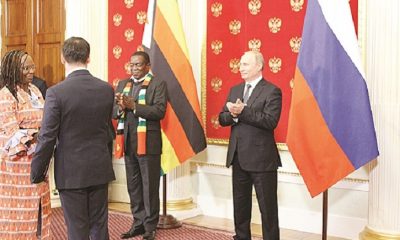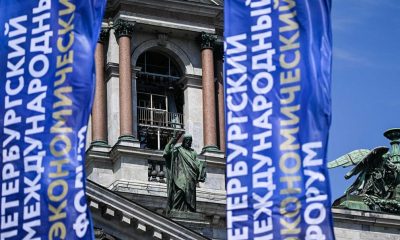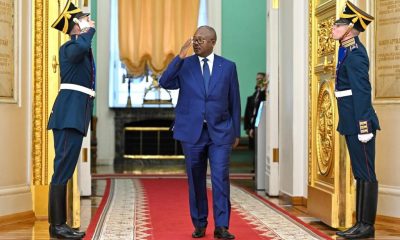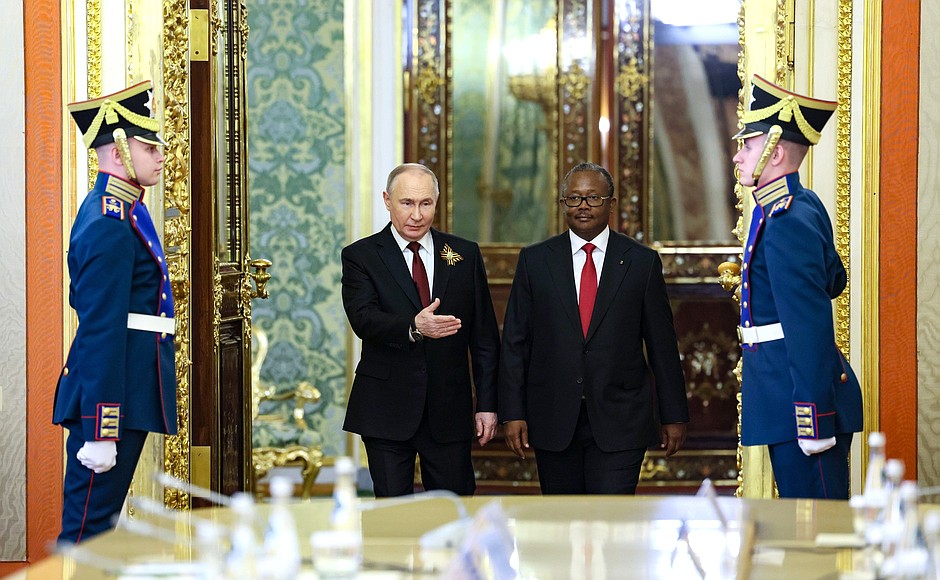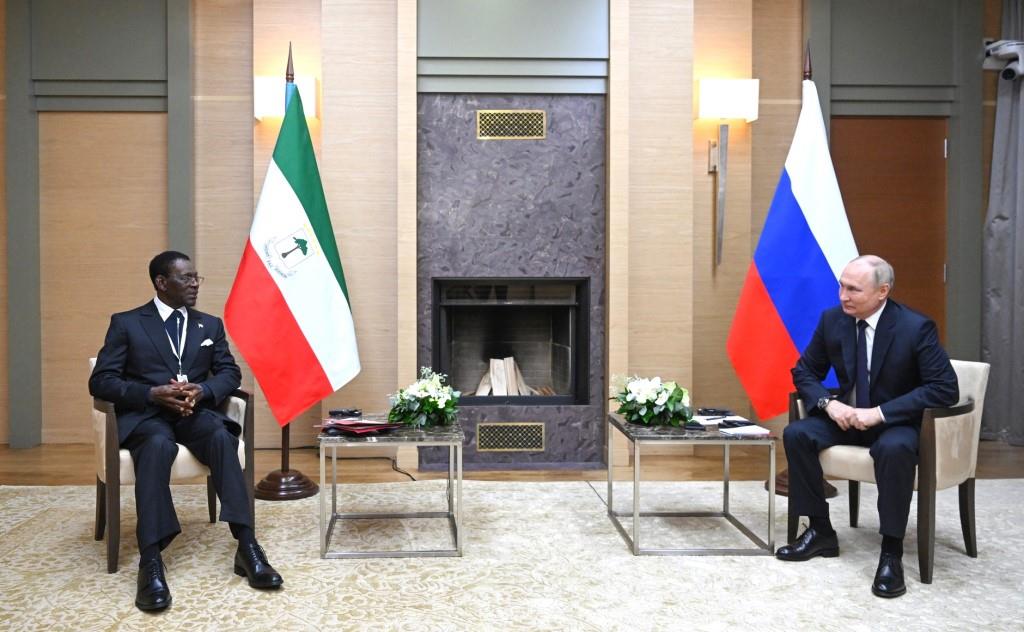World
Russia and Algeria Open New Chapter For Bilateral Cooperation
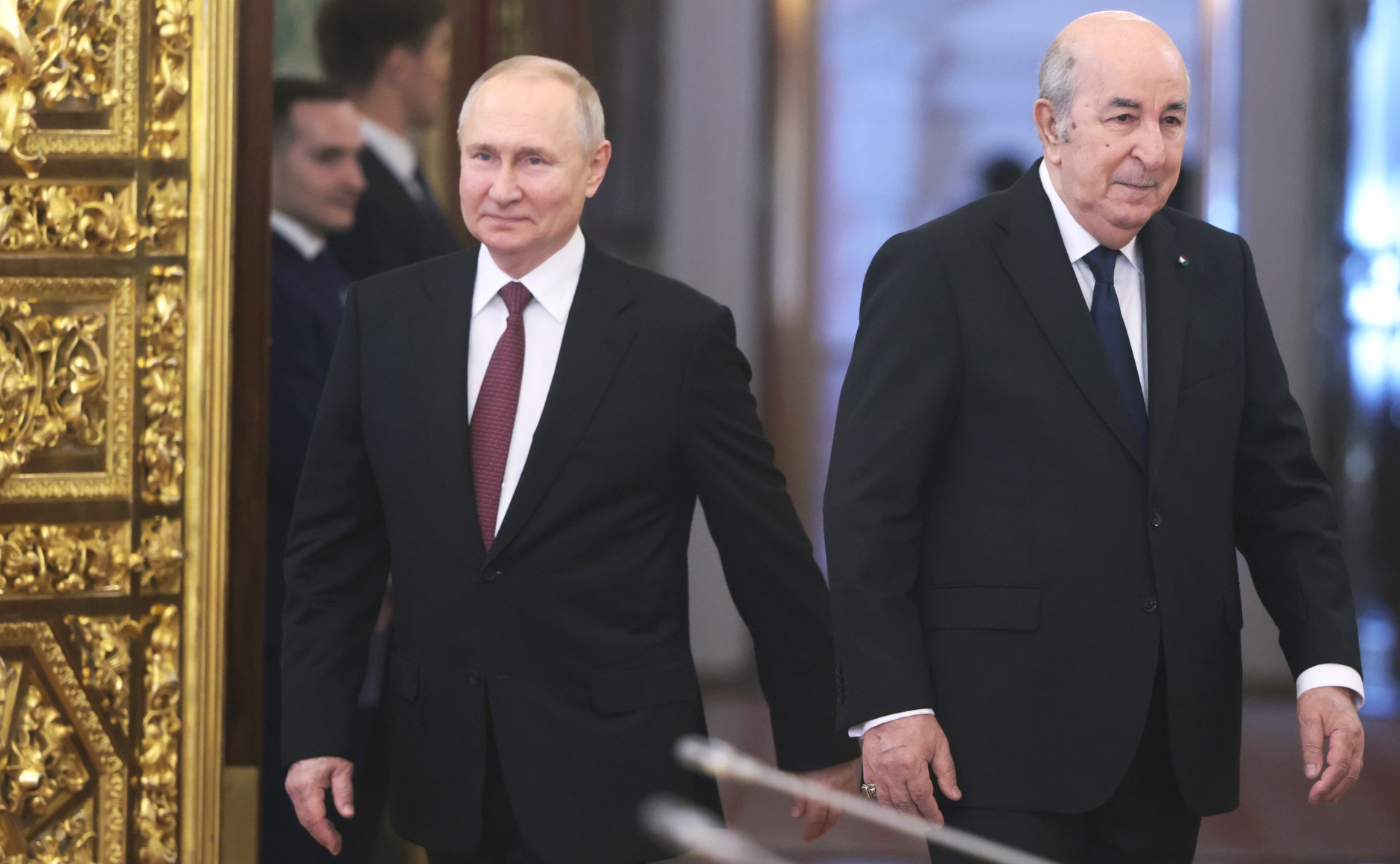
By Kestér Kenn Klomegâh
Algerian President Abdelmadjid Tebboune and his delegation visited Russia from June 14 through 16 to forge a strategic partnership between the two countries. He went to Moscow at the invitation of Russian President Vladimir Putin. This special invitation had been conveyed by Foreign Minister Sergey Lavrov during his visit to Algiers in May last year to strengthen relations of “friendship and cooperation” between the two countries. Some Algerian media have criticized the visit amid Russia’s war in Ukraine.
The Algerian leader brought an extensive ministerial delegation to attend the 26th International Economic Forum (SPIEF)held at the ExpoForum Convention and Exhibition Centre in St. Petersburg, the second-largest city in the Russian Federation. The significance of this visit is that (i) Algeria intends to convince potential Russian investors about the economic opportunities available in this North African country and (ii) to make conscious attempts at seeking support for its ascension into the BRICS, which includes Brazil, Russia, India, China and South Africa.
On June 14, Chairman of the Delovaya Rossiya (Business Russia) Association, Alexey Repik, at the Russian-Algerian business forum stressed that “Russian business welcomes Algeria’s application for admission to the BRICS+ format,” but the final decision would be determined on the basis, and criteria set the BRICS. South Africa will host the next BRICS summit in August in Johannesburg.
In addition to the above, Alexey Repik further noted that a number of measures should be taken to expand economic cooperation between entrepreneurs of the two countries. According to my research sources, Delovaya Rossiya comprises 72 regional and 43 sectoral unions. Its influence has grown substantially over these years. Evidence of this resides in the tangible results of its activities and, of course, in the growing role of industrial production businesses in the Russian Federation.
That’s quite a serious organisation. Therefore it is important that Russia keeps its competitive edge in this market in this volatile North Africa. Like many African countries, Algeria favours foreign investment, but its political situation restricts and drives away potential Western businesses. The country has experienced a wave of economic protests and demonstrations over the previous years.
There’s nothing to be afraid of, as risk management is part of the business. It implies that Russian business leaders from this organisation are desirous of exploring the geographical proximity, but still, there are doubts if investment be undertaken due to instability in the Maghreb region, especially in Algeria and Libya.
In particular, extending a visa-free regime to business representatives and expanding travel opportunities is necessary. This could be the first step to facilitating travel possibilities between Russia and Algeria. There are some more challenges, including logistics, trade preferences and customs tariffs. Delovaya Rossiya Chairman Repik stressed, during his discussions and with entrepreneurial optimism, that the potential for cooperation has not been fully fulfilled, primarily in agricultural exports: Russian grain and Algerian olives and dates.
According to reports, Russia 2021 exported $1.48 billion worth to Algeria, while during the same year, Algeria only exported $17.3 million, primarily tropical fruits, to Russia. More attention should be paid to projects related to innovation as an additional step to widen economic cooperation. It is, however, believed that “Russian technologies can help increase the competitiveness of Algerian products on world markets.”
Prior to their arrival in Moscow this mid-June, Advisor to the President of the Russian Federation Anton Kobyakov held discussions with Ambassador Extraordinary and Plenipotentiary of Algeria to Russia Smail Benamara. Kobyakov emphasized the noticeable strengthening of multifaceted strategic cooperation between the countries: “Last year marked the 60th anniversary of the establishment of diplomatic relations between our countries, and we can say with all certainty that the bonds of friendship and cooperation between our countries and peoples have stood the test of time. The People’s Democratic Republic of Algeria has proven itself a reliable partner. I am sure that the Algerian delegation’s participation in SPIEF will facilitate further all-encompassing Russian-Algerian cooperation.”
One important task involves increasing and diversifying trade between the countries. Algeria has been one of Russia’s most important trading partners in Africa for many years now. As of the end of 2022, Algeria ranked third in terms of trade turnover among Russia’s African partners, though great potential still remains for further commercial and economic interaction.
“It means a lot to us that Russian partners also attach such importance to our delegation’s attendance at the Forum and would like to develop relations between Russia and Algeria further. We will do everything we can to accelerate mutually beneficial projects,” Benamara reassured, as this constitutes one of his diplomatic tasks in the Russian Federation.
Algeria could become Russia’s outpost in North Africa and a partner in the global gas market in this changing geopolitical situation. Weighing the prospects for Russian-Algerian cooperation, Stanislav Mitrakhovich, an Expert at the Financial University and the National Energy Security Fund, named the field of energy as one of the top priority areas for joint initiatives.
“Algeria is one of the largest gas suppliers to the EU, and European politicians have been trying to convince this Arab country to increase gas supplies. However, domestic consumption there is growing and increased production demands large-scale investments. Algeria will increase liquified natural gas supplies, but pipeline exports are more complicated: Algeria is not happy with Spain’s position in the Western Sahara conflict, where Madrid supports Morocco. So, the gas pipeline from Algeria to Spain via Morocco has ceased to function as an export route to Europe; only an underwater pipeline from Algeria to Europe remains,” he told Financial Daily Kommersant before the presidents’ official talks.
“Under current conditions, Russia could potentially offer Algeria, if not complete market sharing, at least assistance in coordinating issues concerning priority export destinations and counteracting attempts by Western countries to introduce gas price limit mechanisms, as well as in fighting discrimination by (Green-oriented) European politicians against gas as an energy resource,” Stanislav Mitrakhovich concluded, adding that “Russia has proposals for Algeria on nuclear energy and on agriculture. Additionally, Russia, and previously the USSR, supported Algeria precisely on the sensitive issue of Western Sahara.”
On June 15, Algerian President Abdelmadjid Tebboune’s talks with Russian President Vladimir Putin touched on the strategic partnership and international issues, including the Middle East, the Sahel region, as well as energy cooperation within the OPEC+, the Kremlin’s information portal said. Russia and Algeria are working closely together as part of OPEC+ and the Gas Exporting Countries Forum. There was also a declaration signed which aimed at deepening cooperation. It bolsters Russia-Algeria relations.
“Cooperation between Russia and Algeria is now truly multidimensional and has considerable potential for further development. The declaration on deepening the strategic partnership between Russia and Algeria, which marks the beginning of a new, even more, advanced stage of our bilateral relations,” Putin said.
According to him, regular political dialogue plays an important role. “We are in almost constant contact with you; our colleagues are working,” the Russian president pointed out and added that Algeria is one of Russia’s three leading trade partners on the African continent. Speaking about the Russia-Algeria Business Forum, Putin said that he hoped the interest of both sides in such events “will only grow.”
Putin reminded that “relations with Algeria are of particular importance for our country and are of a strategic nature; we recalled that relations between Russia and Algeria began to take shape back in the mid-1950s and developed. We can say that they were already strategic in nature – without any exaggeration.”
Last year marked the 60th anniversary of establishing diplomatic relations between both countries. The USSR provided significant support during the liberation struggle, and in the early years of Algeria’s independence, it contributed to the formation of Algeria as an independent, sovereign state and the formation of its economy in a number of areas.
Regular political dialogue plays an important role, constantly working with colleagues: Minister of Foreign Affairs Sergey Lavrov, Secretary of the Security Council Nikolai Patrushev, and Chairman of the Upper House of the Russian Parliament Valentina Matvienko. An intergovernmental commission also coordinates the development in various spheres of mutual interest.
Algeria is one of Russia’s three leading trade partners on the African continent. “I would also like to note that Russian-Algerian coordination within multilateral formats and organizations is also at a good level. In conclusion, our efforts through OPEC Plus and the Gas Exporting Countries Forum contribute to stabilising world energy markets,” Putin said.
President Abdelmadjid Tebboune expressed deep satisfaction with this meeting. This testifies to the depth of friendship between Algeria and the Russian Federation. “First, we must preserve our independence – thanks to the support of the Russian Federation, which provides us with weapons to maintain our independence in these difficult conditions. Even before we started negotiations, we almost agreed on all the points related to the international situation. As you know, the situation is very tense. It is necessary that we speed up the process, that we enter the BRICS group and that we accept not dollars, not euros. This will be beneficial for Algeria,” he told Putin.
“As for the geopolitical situation, relations here, we must touch on the Libyan issue. Libya is a friend of Russia and Algeria, so we always want stability in this country. With regard to the Sahel region, we support the relations that exist between Mali and the Russian Federation. Mali is a neighbour of our country. In all conditions, we must talk and discuss all issues. We have an agreement called the Algiers Agreement,” he underlined in his speech at the Kremlin.
Russia previously signed agreements within the framework of the Joint Military-Technical Cooperation. Besides importing military weapons and equipment, Russia has little investment in its economic sectors. Most of Algeria’s weapons are imported from Russia, with whom they are close allies. For instance, in 2007, the Algerian Air Force signed a deal with Russia to purchase 49 MiG-29SMT and 6 MiG-29UBT at an estimated cost of $1.9 billion. Russia is also building two 636-type diesel submarines for Algeria.
Over the years, Algeria has been looking forward to expanding commercial and economic cooperation with Russia. The state dominates the economy, a legacy of the country’s socialist post-independence development model. In recent years, the Algerian government has halted the privatization of state-owned industries and imposed restrictions on imports and foreign involvement in its economy.
Considered part of the Maghreb region and along with the Mediterranean Sea, Algeria has an estimated population of 44 million. It has large untapped quantities of hydrocarbons. Algeria has the 10th largest reserves of natural gas in the world and the sixth largest gas exporter and since 1969 a member of the Organisation of the Petroleum Exporting Countries.
Gas-rich Algeria is in a delicate position regarding its long-standing ties to Russia. With drastically less capacity, Algeria is increasingly eyed by European countries looking to reduce their reliance on Russian energy amid the war in Ukraine. The North African nation has replaced Russia as Italy’s No. 1 energy supplier. Russia has long supplied Algeria with military equipment.
The theme of the 26th St. Petersburg forum: ‘Sovereign Development as the Basis of a Just World: Joining Forces for Future Generations’ and significant questions discussed were related to the key trends and changes in the Russian and global economy, aspects of the emerging multipolar world. Business issues were connected with Eurasia and Asian-Pacific region. As expected, Africa featured on the sidelines.
SPIEF is an annual gathering of influential Russian and international politicians, government officials, businessmen and representatives of the academic community. The St. Petersburg International Economic Forum was launched in 1997, and since 2006, it has been held under the patronage and with the Russian Federation President’s participation.
World
AfBD, AU Renew Call for Visa-Free Travel to Boost African Economic Growth

By Adedapo Adesanya
The African Development Bank (AfDB) and the African Union have renewed their push for visa-free travel to accelerate Africa’s economic transformation.
The call was reinforced at a High-Level Symposium on Advancing a Visa-Free Africa for Economic Prosperity, where African policymakers, business leaders, and development institutions examined the need for visa-free travel across the continent.
The consensus described the free movement of people as essential to unlocking Africa’s economic transformation under the African Continental Free Trade Area (AfCFTA).
The symposium was co-convened by AfDB and the African Union Commission on the margins of the 39th African Union Summit of Heads of State and Government in Addis Ababa.
The participants framed mobility as the missing link in Africa’s integration agenda, arguing that while tariffs are falling under AfCFTA, restrictive visa regimes continue to limit trade in services, investment flows, tourism, and labour mobility.
On his part, Mr Alex Mubiru, Director General for Eastern Africa at the African Development Bank Group, said that visa-free travel, interoperable digital systems, and integrated markets are practical enablers of enterprise, innovation, and regional value chains to translate policy ambitions into economic activity.
“The evidence is clear. The economics support openness. The human story demands it,” he told participants, urging countries to move from incremental reforms to “transformative change.”
Ms Amma A. Twum-Amoah, Commissioner for Health, Humanitarian Affairs and Social Development at the African Union Commission, called for faster implementation of existing continental frameworks.
She described visa openness as a strategic lever for deepening regional markets and enhancing collective responses to economic and humanitarian crises.
Former AU Commission Chairperson, Ms Nkosazana Dlamini-Zuma, reiterated that free movement is central to the African Union’s long-term development blueprint, Agenda 2063.
“If we accept that we are Africans, then we must be able to move freely across our continent,” she said, urging member states to operationalise initiatives such as the African Passport and the Free Movement of Persons Protocol.
Ghana’s Trade and Industry Minister, Mrs Elizabeth Ofosu-Adjare, shared her country’s experience as an early adopter of open visa policies for African travellers, citing increased business travel, tourism, and investor interest as early dividends of greater openness.
The symposium also reviewed findings from the latest Africa Visa Openness Index, which shows that more than half of intra-African travel still requires visas before departure – seen by participants as a significant drag on intra-continental commerce.
Mr Mesfin Bekele, Chief Executive Officer of Ethiopian Airlines, called for full implementation of the Single African Air Transport Market (SAATM), saying aviation connectivity and visa liberalisation must advance together to enable seamless travel.
Regional representatives, including Mr Elias Magosi, Executive Secretary of the Southern Africa Development Community, emphasised the importance of building trust through border management and digital information-sharing systems.
Ms Gabby Otchere Darko, Executive Chairman of the Africa Prosperity Network, urged governments to support the “Make Africa Borderless Now” campaign, while tourism campaigner Ras Mubarak called for more ratifications of the AU Free Movement of Persons protocol.
Participants concluded that achieving a visa-free Africa will require aligning migration policies, digital identity systems, and border infrastructure, alongside sustained political commitment.
World
Nigeria Exploring Economic Potential in South America, Particularly Brazil

By Kestér Kenn Klomegâh
In this interview, Uche Uzoigwe, Secretary-General of NIDOA-Brazil, discusses the economic potential in South America, particularly Brazil, and investment incentives for Brazilian corporate partners for the Federal Republic of Nigeria (FRN). Follow the discussion here:
How would you assess the economic potential in the South American region, particularly Brazil, for the Federal Republic of Nigeria? What investment incentives does Nigeria have for potential corporate partners from Brazil?
As the Secretary of NIDOA Brazil, my response to the questions regarding the economic potentials in South America, particularly Brazil, and investment incentives for Brazilian corporate partners would be as follows:
Brazil, as the largest economy in South America, presents significant opportunities for the Federal Republic of Nigeria. The country’s diverse economy is characterised by key sectors such as agriculture, mining, energy, and technology. Here are some factors to consider:
- Natural Resources: Brazil is rich in natural resources like iron ore, soybeans, and biofuels, which can be beneficial to Nigeria in terms of trade and resource exchange.
- Growing Agricultural Sector: With a well-established agricultural sector, Brazil offers potential collaboration in agri-tech and food security initiatives, which align with Nigeria’s goals for agricultural development.
- Market Size: Brazil boasts a large consumer market with a growing middle class. This represents opportunities for Nigerian businesses looking to export goods and services to new markets.
- Investment in Infrastructure: Brazil has made significant investments in infrastructure, which could create opportunities for Nigerian firms in construction, engineering, and technology sectors.
- Cultural and Economic Ties: There are historical and cultural ties between Nigeria and Brazil, especially considering the African diaspora in Brazil. This can facilitate easier business partnerships and collaborations.
In terms of investment incentives for potential corporate partners from Brazil, Nigeria offers several attractive incentives for Brazilian corporate partners, including:
- Tax Incentives: Various tax holidays and concessions are available under the Nigerian government’s investment promotion laws, particularly in key sectors like agriculture, manufacturing, and technology.
- Repatriation of Profits: Brazil-based companies investing in Nigeria can repatriate profits without restrictions, thus enhancing their financial viability.
- Access to the African Market: Investment in Nigeria allows Brazilian companies to access the broader African market, benefiting from Nigeria’s membership in regional trade agreements such as ECOWAS.
- Free Trade Zones: Nigeria has established free trade zones that offer companies the chance to operate with reduced tariffs and fewer regulatory burdens.
- Support for Innovation: The Nigerian government encourages innovation and technology transfer, making it attractive for Brazilian firms in the tech sector to collaborate, particularly in fintech and agriculture technology.
- Collaborative Ventures: Opportunities exist for joint ventures with local firms, leveraging local knowledge and networks to navigate the business landscape effectively.
In conclusion, fostering a collaborative relationship between Nigeria and Brazil can unlock numerous economic opportunities, leading to mutual growth and development in various sectors. We welcome potential Brazilian investors to explore these opportunities and contribute to our shared economic goals.
In terms of this economic cooperation and trade, what would you say are the current practical achievements, with supporting strategies and systemic engagement from NIDOA?
As the Secretary of NIDOA Brazil, I would highlight the current practical achievements in economic cooperation and trade between Nigeria and Brazil, alongside the supporting strategies and systemic engagement from NIDOA.
Here are some key points:
Current Practical Achievements
- Increased Bilateral Trade: There has been a notable increase in bilateral trade volume between Nigeria and Brazil, particularly in sectors such as agriculture, textiles, and technology. Recent trade agreements and discussions have facilitated smoother trade relations.
- Joint Ventures and Partnerships: Successful joint ventures have been established between Brazilian and Nigerian companies, particularly in agriculture (e.g., collaboration in soybean production and agricultural technology) and energy (renewables, oil, and gas), demonstrating commitment to mutual development.
- Investment in Infrastructure Development: Brazilian construction firms have been involved in key infrastructure projects in Nigeria, contributing to building roads, bridges, and facilities that enhance connectivity and economic activity.
- Cultural and Educational Exchange Programs: Programs facilitating educational exchange and cultural cooperation have led to strengthened ties. Brazilian universities have partnered with Nigerian institutions to promote knowledge transfer in various fields, including science, technology, and arts.
Supporting Strategies
- Strategic Trade Dialogue: NIDOA has initiated regular dialogues between trade ministries of both nations to discuss trade barriers, potential markets, and cooperative opportunities, ensuring both countries are aligned in their economic goals.
- Investment Promotion Initiatives: Targeted initiatives have been established to promote Brazil as an investment destination for Nigerian businesses and vice versa. This includes showcasing success stories at international trade fairs and business forums.
- Capacity Building and Technical Assistance: NIDOA has offered capacity-building programs focused on enhancing Nigeria’s capabilities in agriculture and technology, leveraging Brazil’s expertise and sustainable practices.
- Policy Advocacy: Continuous advocacy for favourable trade policies has been a key focus for NIDOA, working to reduce tariffs and promote economic reforms that facilitate investment and trade flows.
Systemic Engagement
- Public-Private Partnerships (PPPs): Engaging the private sector through PPPs has been essential in mobilising resources for development projects. NIDOA has actively facilitated partnerships that leverage both public and private investments.
- Trade Missions and Business Delegations: Organised trade missions to Brazil for Nigerian businesses and vice versa, allowing for direct engagement with potential partners, fostering trust and opening new channels for trade.
- Monitoring and Evaluation: NIDOA implements a rigorous monitoring and evaluation framework to assess the impact of various initiatives and make necessary adjustments to strategies, ensuring effectiveness in achieving economic cooperation goals.
Through these practical achievements, supporting strategies, and systemic engagement, NIDOA continues to play a pivotal role in enhancing economic cooperation and trade between Nigeria and Brazil. By fostering collaboration and leveraging shared resources, we aim to create a sustainable and mutually beneficial economic environment that promotes growth for both nations.
Do you think the changing geopolitical situation poses a number of challenges to connecting businesses in the region with Nigeria, and how do you overcome them in the activities of NIDOA?
The changing geopolitical situation indeed poses several challenges for connecting businesses in the South American region, particularly Brazil, with Nigeria. These challenges include trade tensions, shifting alliances, currency fluctuations, and varying regulatory environments. Below, I will outline some of the specific challenges and how NIDOA works to overcome them:
Current Challenges
- No Direct Flights: This challenge is obviously explicit. Once direct flights between Brazil and Nigeria become active, and hopefully this year, a much better understanding and engagement will follow suit.
- Trade Restrictions and Tariffs: Increasing trade protectionism in various regions can lead to higher tariffs and trade barriers that hinder the movement of goods between Brazil and Nigeria.
- Currency Volatility: Fluctuations in the value of currencies can complicate trade agreements, pricing strategies, and overall financial planning for businesses operating in both Brazil and Nigeria.
- Different regulatory frameworks and compliance requirements in both countries can create challenges for businesses aiming to navigate these systems efficiently.
- Supply Chain Disruptions: Changes in global supply chains due to geopolitical factors may disrupt established networks, impacting businesses relying on imports and exports between the two nations.
Overcoming Challenges through NIDOA.
NIDOA actively engages in discussions with both the Brazilian and Nigerian governments to advocate for favourable trade policies and agreements that reduce tariffs and improve trade conditions. This year in October, NIDOA BRAZIL holds its TRADE FAIR in São Paulo, Brazil.
What are the popular sentiments among the Nigerians in the South American diaspora? As the Secretary-General of the NIDOA, what are your suggestions relating to assimilation and integration, and of course, future perspectives for the Nigerian diaspora?
As the Secretary-General of NIDOA, I recognise the importance of understanding the sentiments among Nigerians in the South American diaspora, particularly in Brazil.
Many Nigerians in the diaspora take pride in their cultural roots, celebrating their heritage through festivals, music, dance, and culinary traditions. This cultural expression fosters a sense of community and belonging.
While many individuals embrace their new environments, they often face challenges related to cultural differences, language barriers, and social integration, which can lead to feelings of isolation.
Many express optimism about opportunities in education, business, and cultural exchange, viewing their presence in South America as a chance to expand their horizons and contribute to economic activities both locally and back in Nigeria.
Sentiments regarding acceptance vary; while some Nigerians experience warmth and hospitality, others encounter prejudice or discrimination, which can impact their overall experience in the host country. NIDOA BRAZIL has encouraged the formation of community organisations that promote networking, cultural exchange, and social events to foster a sense of belonging and support among Nigerians in the diaspora. There are currently two forums with over a thousand Nigerian members.
Cultural Education and Awareness Programs: NIDOA BRAZIL organises cultural education programs that showcase Nigerian heritage to local communities, promoting mutual understanding and appreciation that can facilitate smoother integration.
Language and Skills Training: NIDOA BRAZIL provides language courses and skills training programs to help Nigerians, especially students in tertiary institutions, adapt to their new environment, enhancing communication and employability within the host country.
Engaging in Entrepreneurship: NIDOA BRAZIL supports the entrepreneurial spirit among Nigerians in the diaspora by facilitating access to resources, mentorship, and networks that can help them start businesses and create economic opportunities.
Through its AMBASSADOR’S CUP COMPETITION, NIDOA Brazil has engaged students of tertiary institutions in Brazil to promote business projects and initiatives that can be implemented in Nigeria.
NIDOA BRAZIL also pushes for increased tourism to Brazil since Brazil is set to become a global tourism leader in 2026, with a projected 10 million international visitors, driven by a post-pandemic rebound, enhanced air connectivity, and targeted marketing strategies.
Brazil’s tourism sector is poised for a remarkable milestone in 2026, as the country expects to welcome over 10 million international visitors—surpassing the previous record of 9.3 million in 2025. This expected surge represents an ambitious leap, nearly doubling the country’s foreign-arrival numbers within just four years, a feat driven by a combination of pent-up global demand, strategic air connectivity improvements, and a highly targeted marketing campaign.
World
African Visual Art is Distinguished by Colour Expression, Dynamic Form—Kalalb

By Kestér Kenn Klomegâh
In this insightful interview, Natali Kalalb, founder of NAtali KAlalb Art Gallery, discusses her practical experiences of handling Africa’s contemporary arts, her professional journey into the creative industry and entrepreneurship, and also strategies of building cultural partnership as a foundation for Russian-African bilateral relations. Here are the interview excerpts:
Given your experience working with Africa, particularly in promoting contemporary art, how would you assess its impact on Russian-African relations?
Interestingly, my professional journey in Africa began with the work “Afroprima.” It depicted a dark-skinned ballerina, combining African dance and the Russian academic ballet tradition. This painting became a symbol of cultural synthesis—not opposition, but dialogue.
Contemporary African art is rapidly strengthening its place in the world. By 2017, the market was growing so rapidly that Sotheby launched its first separate African auction, bringing together 100 lots from 60 artists from 14 foreign countries, including Algeria, Ghana, Mali, Nigeria, Senegal, and others. That same year during the Autumn season, Louis Vuitton Foundation in Paris hosted a major exhibition dedicated to African art. According to Artnet, sales of contemporary African artists reached $40 million by 2021, a 434% increase in just two years. Today, Sotheby holds African auctions twice a year, and in October 2023, they raised $2.8 million.
In Russia, this process manifests itself through cultural dialogue: exhibitions, studios, and educational initiatives create a space of trust and mutual respect, shaping the understanding of contemporary African art at the local level.
Do you think geopolitical changes are affecting your professional work? What prompted you to create an African art studio?
The international context certainly influences cultural processes. However, my decision to work with African themes was not situational. I was drawn to the expressiveness of African visual language—colour, rhythm, and plastic energy. This theme is practically not represented systematically and professionally in the Russian art scene.
The creation of the studio was a step toward establishing a sustainable platform for cultural exchange and artistic dialogue, where the works of African artists are perceived as a full-fledged part of the global cultural process, rather than an exotic one.
To what extent does African art influence Russian perceptions?
Contemporary African art is gradually changing the perception of the continent. While previously viewed superficially or stereotypically, today viewers are confronted with the depth of artistic expression and the intellectual and aesthetic level of contemporary artists.
Portraits are particularly impactful: they allow us to see not just an abstract image of a “continent,” but a concrete personality, character, and inner dignity. Global market growth data and regular auctions create additional trust in African contemporary art and contribute to its perception as a mature and valuable movement.
Does African art reflect lifestyle and fashion? How does it differ from Russian art?
African art, in my opinion, is at its peak in everyday culture—textiles, ornamentation, bodily movement, rhythm. It interacts organically with fashion, music, interior design, and the urban environment. The Russian artistic tradition is historically more academic and philosophical. African visual art is distinguished by greater colour expression and dynamic form. Nevertheless, both cultures are united by a profound symbolic and spiritual component.
What feedback do you receive on social media?
Audience reactions are generally constructive and engaging. Viewers ask questions about cultural codes, symbolism, and the choice of subjects. The digital environment allows for a diversity of opinions, but a conscious interest and a willingness to engage in cultural dialogue are emerging.
What are the key challenges and achievements of recent years?
Key challenges:
- Limited expert base on African contemporary art in Russia;
- Need for systematic educational outreach;
- Overcoming the perception of African art as exclusively decorative or ethnic.
Key achievements:
- Building a sustainable audience;
- Implementing exhibition and studio projects;
- Strengthening professional cultural interaction and trust in African
contemporary art as a serious artistic movement.
What are your future prospects in the context of cultural diplomacy?
Looking forward, I see the development of joint exhibitions, educational programs, and creative residencies. Cultural diplomacy is a long-term process based on respect and professionalism. If an artistic image is capable of uniting different cultural traditions in a single visual space, it becomes a tool for mutual understanding.
-

 Feature/OPED6 years ago
Feature/OPED6 years agoDavos was Different this year
-
Travel/Tourism10 years ago
Lagos Seals Western Lodge Hotel In Ikorodu
-

 Showbiz3 years ago
Showbiz3 years agoEstranged Lover Releases Videos of Empress Njamah Bathing
-

 Banking8 years ago
Banking8 years agoSort Codes of GTBank Branches in Nigeria
-

 Economy3 years ago
Economy3 years agoSubsidy Removal: CNG at N130 Per Litre Cheaper Than Petrol—IPMAN
-

 Banking3 years ago
Banking3 years agoSort Codes of UBA Branches in Nigeria
-

 Banking3 years ago
Banking3 years agoFirst Bank Announces Planned Downtime
-

 Sports3 years ago
Sports3 years agoHighest Paid Nigerian Footballer – How Much Do Nigerian Footballers Earn


